Last week we touched on a topic that was a personal to me, but I think important for other business owners to read about: setting boundaries and sticking up for yourself in your business. Building off that topic and idea, I wanted to move into how you can make time for your life and activities outside of your business (even if you feel like you are working 25/8).
This time last year I was at the beginning of a downward spiral business-wise and if I am being completely transparent with you, some of those feeling seep in from time to time – so I totally understand why last summer happened.
Here’s the thing – I am a summer lover to the extreme and living in Charleston fills my heart with joy. The days are already longer, warmer, and just calling me to be outside, be with friends, go on bike rides, lay out a the beach, etc. Last year I let myself do that – and lost track of my business, put myself into stress mode, and ended up burning out because of weird schedules and making up for my summer fun. In an effort to avoid any of those sorts of mishaps from now on, I’ve made a lot of changes (which if you follow the blog, I’m sure you’ve gathered at this point).
But here we are, my favorite time of the year drawing close and days like today I find myself staring out the window and longing to be outside in the sun. But, luckily, this year I’ve got a few things as my disposal to make sure I don’t fall into the same traps as last year and still maintain my business WHILE having time for fun and a life.
AUTOMATE AS MUCH AS POSSIBLE
I know you hear this one a lot, but having things run smoothly with little to no effort is key for work/life balance. Invest in systems and/or people that can take things that you dislike, don’t have time for, or can’t do and free up your time to focus on your business (and have fun).
Hiring out a team is a super scary venture and I get how that can be something you want to put off. Even if you do decide that you’re not ready for a team, you can still save yourself hours by investing in software or programs that take work off your plate. My favorites are SmarterQueue and Tailwind – between the two of those most of my social media is taken care of.
You can also automate things like auto-responder emails that help you feel less anxious about needing to answer an email immediately. Something that ends up being a big distraction to me is getting an email with a quick ask (something that will take me less than 15 minutes) so I stop and do it really quick. Though it seems like a quick and innocent action, it reality that sort of multitasking actually throws a wrench in my overall productivity – so instead of sitting and having my inbox in my face all day, auto-responders can alleviate that feeling of needing to check it constantly.
Similarly, it helps me not feel anxious when I do get an email to my phone while I am not working. I still might peruse the subject and sender, but I don’t feel like I need to stop what I am doing (i.e. something not work related) to answer right away.
WORK AHEAD WHEN THE OPTION PRESENTS ITSELF
This is something that I love to do. I do keep a pretty regimented schedule of what I am accessible to clients, but I don’t mind sometimes working into the evenings if I feel particularly motivated. My partner has a sporadic schedule sometimes, and most of my 9-5er friends aren’t super active during the week, so on a Tuesday night you might find me parked in front of a Tiny House Hunters marathon or you might find me working ahead.
What do I mean working ahead? Well, I make a weekly to do list on Monday and then each morning sit and pull the top 3 tasks from it that I want to work on that day. But sometimes, if I decide I feel like working, I’ll go ahead and knock some more things off that to do list.
I’ll be honest, it’s always the most fun things I decide to work on – making cute icons or creating a workbook – but regardless, it gets crossed off the to do list and opens up more time later in the week for me to relax, take a half day, or just feel less stressed.
So I know the point of this post was making time for your life, and you’re probably thinking “wow, working at night, what a life” but for me it clears up more time so that when there’s something I really want to do (go on the boat, etc.) I have already created space in my schedule for it!
SCHEDULE DAYS OFF, HALF DAYS, OR SUMMER FRIDAYS
Another important thing I do is actually pre-schedule days I will take off or take a half-day. Maybe I know that the weather is going to be perfect and my boyfriend is going to have the afternoon open on a Thursday, so I’ll schedule a half day that day and make sure I get my work done accordingly around that.
I guess this exists in a traditional 9-5, so I’m just carrying over habits, but it’s a lot easier because no one is really going to be able to tell you “no” right?! I also have toyed with the idea of scheduling Summer Fridays this year, and stopping working around noon or 1pm on Fridays. I haven’t fully decided, but I think that’s an idea worth exploring. I know a lot of larger businesses do that and I think establishing myself as that type of business owner early on is a great idea.
DON’T OVERCOMMIT
The biggest favor you can do yourself is not overcommitting you time. This is hard, especially when you start getting lots of inquiries and clients. It’s such an exciting feeling – but you have to be realistic with what you can actually do and accomplish. When I started really getting a lot of clients over the past few months, I had to stop and decide just how many hours a week was I a) willing to work on client work and b) actually able to work on client work. I landed around 25 hours/week of client work would be my maximum and have worked hard to keep it around that figure.
Overcommitting is easy to do – you don’t want to disappoint people, the money seems great, etc. But what will happen, in reality, is that your work will suffer and clients wont have as good of experiences, which overall will be much worse for your business. If you haven’t already worked out exactly how many clients you can take on (or how many hours of work you can do), I highly recommend doing that math.
Overall, I’ll say that in my experience having a work/life balance is essential to not getting burned out – but focusing on the fact that regardless, the work needs to get done, is important too. I’ve been focusing on creating ways to make that happen that don’t feel like I am sacrificing “fun time” or “me time” and that has seemed to work best so far!








Hi! I’m Kaitlyn!
I believe that you can create a life and business you love by listening to your own inner guidance system. I think there's plenty of strategies + hacks to learn and a ton of “how to” content you can consume but ultimately you are your best guide, the best guru, the best compass, and the best source of inspiration! I’m here to help you learn to trust that voice inside, step into your incredible power, and create YOUR dream business + life.
Let’s work together!